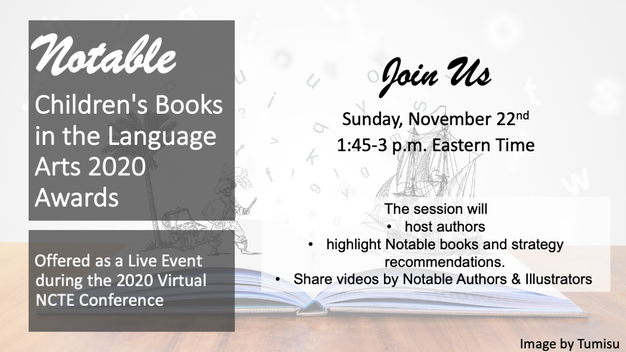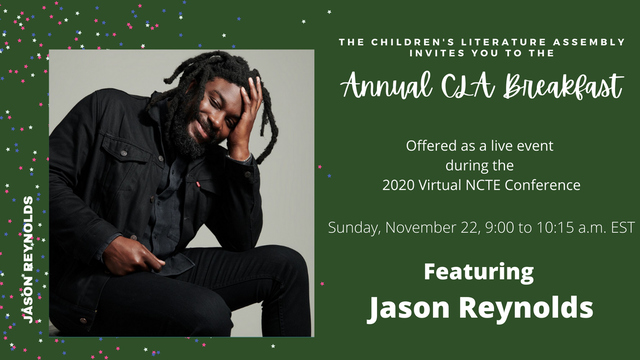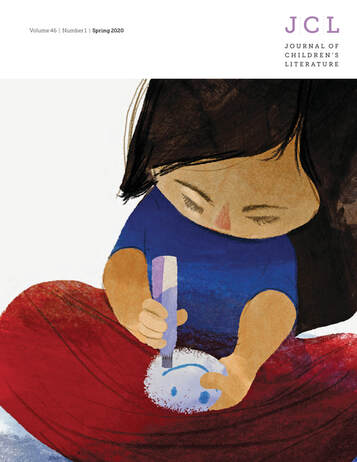BY LAUREN AIMONETTE LIANG Last year, right around this time, the Fall 2019 issue of JCL arrived in the mail. In the President’s Message I had written a bit about my excitement for the upcoming NCTE conference: It starts for me with the airplane travel. Coming from my area, it is rare to board a flight heading to a major conference and not encounter fellow teachers, librarians, and researchers embarking on the same adventure. We wave, ask about colleagues and friends, and buzz a bit with excitement. (I often think the other travelers must later wonder about these groups of individuals who are all grading papers and reading thick books, while simultaneously winning all the in-flight trivia and scrabble games.) Once we arrive at the NCTE city, conference-goers from all over are grabbing bags, looking for shuttles and taxis, and heading off to the area hotels. Immediately there is a shared sense of purpose and anticipation. Conversations break out in the hotel elevators about whether registration is open, and the time of the opening session. Hordes of badge-wearing, tote-bag laden attendees appear in long lines at the coffee stands and take over the sidewalks in their sensible walking shoes as they head off for the day. And then the conference! Hour after hour of thought-provoking sessions, with speakers addressing the important issues in our field, provoking new ideas, and sharing possible solutions. The vibrant displays of new books in the exhibit hall waiting to be shared by knowledgeable and enthusiastic publishers who offer sneak peeks that might be perfect for your classroom. And, best of all, that amazing shared sense of being present with each other—knowing that the people gathered here care just as deeply as you do about supporting children’s and teen’s literacy experiences and growth. The Children’s Literature Assembly events at NCTE are a highlight for many attendees. A history of consistent excellence makes our CLA Notables Session, CLA Master Class, and CLA Breakfast the starred events on many personal conference schedules...
Notable Children’s Books in the Language Arts AwardS
Join the members of the Notable Children’s Books in the Language Arts award committee in a live event on Sunday afternoon from 1:45- 3:00 pm ET. Throughout the fall this blog has featured posts from members of this committee. Join them live for more outstanding 2020 titles and suggestions for classroom use.
Annual CLA Breakfast
Bring your breakfast to listen to amazing author Jason Reynolds, this year’s CLA Breakfast keynote speaker! In a live session Sunday morning from 9:00 – 10:15 am ET, the 2020-21 National Ambassador for Young People’s Literature will talk about his writing and more.
Lauren Aimonette Liang is an associate professor at the University of Utah and the current president of CLA. BY THOMAS CRISP, MARY NAPOLI, VIVIAN YENIKA-AGBAW, & ANGIE ZAPATAChanging the Stories We Share: Transforming the Children’s Literature Landscape
AS PROFESSORS OF EDUCATION, literacy, and children’s and young adult literature, we value the unique position that the Journal of Children’s Literature (JCL) occupies in the field, bridging theory and practice by publishing research-based and theoretical manuscripts that have immediate implications for the ways in which children’s books are shared in elementary and middle-grade classrooms and discussed in communities outside of the classroom. With the November 2015 approval of the National Council of Teachers of English (NCTE) “Resolution on the Need for Diverse Children’s and Young Adult Books,” JCL is committed to the recognition of diverse voices; to the support of emerging Indigenous, Black, and People of Color (IBPoC) scholars and researchers; and to excellence in interdisciplinary research and scholarship in the field of children’s literature. Therefore, we welcome submissions that center literature studies in relation to issues of social justice and equity, representations of populations that have been historically marginalized or underrepresented in children’s texts and culture, and the intersections between popular culture and identity. Our team shares a commitment both to children’s literature and the field of education. We understand how children’s texts contribute to learning and the development of critical literacies and also serve as powerful cultural artifacts that inform the ways readers view and understand themselves and the world in which they live. We believe that all of us concerned with children’s texts (e.g., teachers, teacher educators, librarians, researchers) must attend to the content of children’s books as literary, cultural, and political objects. About Our Team Generally speaking, our professional work is grounded in theories of reader response, critical multiculturalism, and culturally responsive and sustaining pedagogies, and is informed by research and scholarship in education, literary, and cultural studies. Here and elsewhere, the co-editors are listed alphabetically. We are, however, a team of co-editors with shared responsibilities. The order of editors’ names does not indicate any sort of rank.
Our Work with JCL Like so many other readers, our understanding of the field of children’s literature has been shaped and informed by the articles published in JCL, selected, refined, and coordinated by editorial teams including, most recently, Donna Adomat, Karla Möller, and Angela Wiseman; Jonda McNair, Miriam Martinez, and Sharon O’Neal; and Cyndi Giorgis, April Bedford, and Jennifer Fabbi. During our time as editors, we hope to carry on the tradition of excellence cultivated by these and all other editors of the Journal of Children’s Literature. Our team is committed to building upon the work of previous editors by bringing together master teachers, recognized scholars and researchers, and emerging voices (e.g., new scholars, doctoral students) across disciplines as contributors to JCL. We recognize that under the guidance of previous editorial teams, the theoretical content of JCLhas increased. We view this shift as particularly important for teachers and teacher educators in the current context of high-stakes testing (e.g., the edTPA), educational initiatives (e.g., the Common Core State Standards), and the “deprofessionalization” of teachers and the teaching profession. Through JCL, we want to foreground the attention to reader response, critical literacies, critical multiculturalism, and social justice. We will continue to center scholarship and research and explore how theory can guide the ways in which researchers, teachers, teacher educators, and librarians view and explore children’s literature. We plan to make JCL relevant to both educators and scholars by publishing practical yet scholarly pieces that allow readers to think deeply about children’s literature (including visual and multimodal texts) and how it can directly influence the lives of children in their classrooms. To this end, during our tenure as editors, JCL will include the following features:
Finally, as we transition the journal online, our team is committed to making all past issues of JCL available to members of the Children’s Literature Assembly. We are currently scanning all past issues of JCL and its predecessors (e.g., Ripples) and will be making those available in the Members Only section of the Children’s Literature Assembly website. We are grateful to CLA historian Dr. Amy McClure for entrusting us with the assembly’s copies of these archival materials. We are also indebted to Dr. Evie Freeman, who provided us with her personal copies of JCL for use in our scanning. Additional Acknowledgements We would like to thank the following individuals and institutions for their support of our work with the Journal of Children’s Literature:
References
Adichie, C. N. (2009, July). Chimamanda Ngozi Adichie: The danger of a single story [Video file]. Retrieved from https://www.ted.com/talks/chimamanda_adichie_the_danger_of_a_single_story/transcript Short, K. G. (2012). Story as world making. Language Arts, 90(1), 9–17.
|
Authors:
|
CLA
About CLA
|
Journal of Children's Literature
Write for JCL
|
ResourcesCLA-sponsored NCTE Position Statements
|
Members-Only Content
CLA Video Library
|
© COPYRIGHT 2018.
ALL RIGHTS RESERVED |




 RSS Feed
RSS Feed